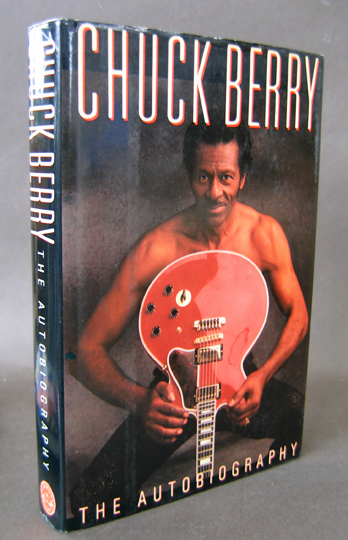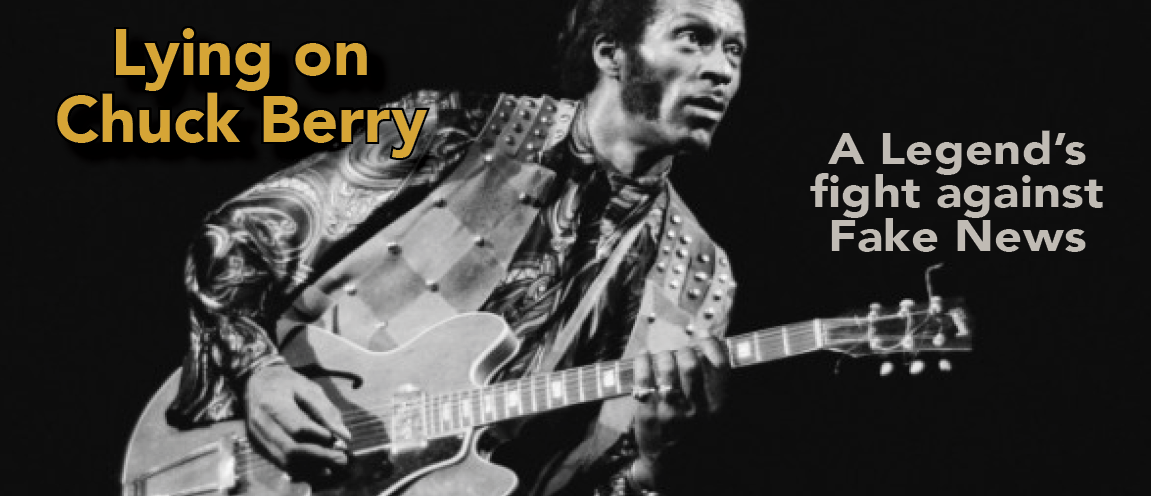Chuck Berry Knows Fake News
Despite the many accolades now being showered upon our recently departed brother Mr. Chuck Berry, the legendary entertainer himself would be the most skeptical about what was being said about him in the media. Long before Donald Trump used the term “fake news,” Chuck Berry explained in his 1987 autobiography why he refused to do interviews. He found that his words were so often twisted, altered, invented, and abused that he simply refused to talk to “reporters” and “journalists”—liars that they are. Here, in his own words published 30 years ago, is Mr. Berry’s own incisive targeting of the “fake news” media:
When I started being interviewed after my first hits in the fifties, I took it for granted that I would be quoted exactly as I had spoken. In answering a question I gave information freely, while staying with the facts. Seeing the results later I soon learned that interviewers would add an opinion or description that would give the quote an entirely different meaning. They would alter my remarks by creating new phrases that changed my meaning or they would insert comments that would imply another slant on what I said.
My desire to be interviewed dwindled over the years as I would read back what I was supposed to have said to reporters. The changes and alterations I detected in reviewing the articles were sometimes better than I could have said it and other times worse, sometimes with southern dialect added. Francine has several extensive interviews printed by magazines like Rolling Stone, Gallery, and the Village Voice, that have all chosen to insert quotes that have yet to be said by me. Also, some of the quotes I did say were rendered in dialect to stereotype black speech. Yet in another part of the same piece would be a mention of my distinct diction!

Then I thought it smart to let journalists record what I would say so that it couldn’t then be mistaken in the article. But a few of these recordings started coming back edited, sometimes with the interviewer inserting questions unlike the original ones I answered. I’ve heard radio interviews, which I had simultaneously recorded with my pocket recorder, replayed after being edited. The edited interview was altered to the extent that some of the questions that were later (in the editing room) inserted around the original answers (I gave to different questions) were replies to a subject never raised originally!
It’s like taking the head from one photo and fitting it to the body of another. Then who is who? Neither is real or true. That is my opinion of interviews (recorded ones) that are all edited.
TV interview. Okay. Beautiful and live, also a challenge of wits between the “ask” and the “shall be given,” plus people can form their own opinion of the truth, whether they want it or not, from visual expressions and so forth.
Seeing how all this was done, I revamped my shrewdness and only allowed visual-sound consultations that were too costly to conduct for just the audio and thus likely not to be edited. I saw to it that they wouldn’t edit it by waving my hand before my face while answering questions to make it too obvious if they cut the scene to insert or omit anything.
Interviews that are taken down in notes or written from memory are less real than taped ones because if quotes are not taken down word for word, they are reconstructed under the influence of the writer’s opinions. But again, it must be that some people don’t know or even care about the truth or what is real anymore. If that be so, why do journalists bother to seek interviews at all, particularly nonrecorded ones? The interviewer could do his thing on it anyway, and usually does. I know many who did and for a long while this caused me to renounce interviewing. I told them that I was not interested in dramatics, only music, and I wrote my own.
The rejection of interviews prompted the reputation that I was negative to them and interviewers. The rumor spread quickly throughout the business. Reporters would come to the dressing room of a concert and start their salutations with, “Hi, Chuck, I know you don’t like to interview, but…” I would try to explain to them what I’d learned about habits they followed. They would declare they were not like that and if I would just answer a few questions, they’d be satisfied. Sometimes I would yield, then later, when reading the clipping, the same ol’ sheet would be hitting the fan club…
Read more of the interesting life of a legend: Chuck Berry: The Autobiography (New York: Fireside / Simon & Schuster, 1988).
Throughout his career Chuck Berry was a victim of white Culture Bandits. The outright theft and counterfeiting of Black talent and culture, and repackaging it for white audiences is not just profitable—it IS “white culture.” Read about this exploitation in the recently updated bestseller HOW WHITE FOLKS GOT SO RICH:


